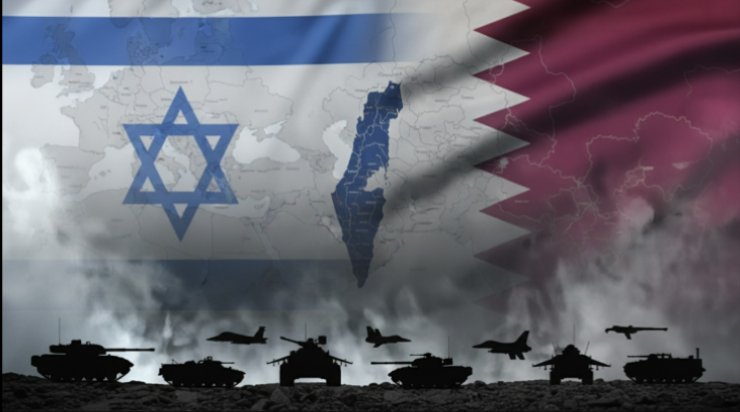Executive Summary
Israel launched an unprecedented military attack against the Doha, Qatar-based Hamas political leadership on September 9, 2025. This signaled a historic increase in Israeli military activity outside of its immediate borders and the inviolability of Gulf Cooperation Council (GCC) territory. Despite its limited military success, the operation has caused significant diplomatic upheaval in the region and a shift in the paradigms surrounding Middle Eastern security.
The attack itself, the series of diplomatic and military developments that followed, and a thorough assessment of the resulting geopolitical risks are all thoroughly examined in this report. It is intended to assist strategic decision-makers and stakeholders in navigating the intricately changing Middle Eastern and international security environment.
1. Context and Background
Hamas political leaders who sought safety in Qatar, a pivotal mediator in the Israel-Gaza conflict and an important intermediary in US-led ceasefire talks, were the target of Israel’s September 9 strike. The goal of the attack was to interfere with Hamas leadership’s ability to plan events and bargain for conditions that would benefit the Palestinian side.
- A ceasefire proposal mediated by the United States was reviewed by Hamas leaders, including important members of the Political Bureau.
- Targeting a residential compound in the Leqtaifiya district of Doha, the strike used sophisticated fighter jets to launch ballistic missiles from a secure air corridor.
- One officer from the Qatari Internal Security Forces and five Hamas members were among the dead.
- By breaching Qatar’s territorial sovereignty, this operation violated multiple international standards and raised serious concerns about the future of mediation in regional disputes.
2. Timeline of the Event
Date | Event |
June-September 2025 | Israel’s strategic intelligence gathering and operational planning |
Sept 9, 2025 | Israeli airstrike on Hamas headquarters in Doha; immediate fatalities and injuries reported |
Sept 9-11 | International condemnation, Qatar’s diplomatic mobilization |
Sept 15 | Emergency Arab-Islamic summit convened in Doha; collective condemnation of Israeli action |
Sept 16-18 | GCC activates joint defense mechanisms; regional calls for sanctions intensify |
Sept 17 | Saudi Arabia and Pakistan sign a mutual defense pact signaling deeper security alignments |
Sept 18 onwards | Ongoing diplomatic maneuvers including UN outreach, legal challenges and mediation efforts continue |
3. Examining the Strike and Its Tactical Results
3.1 Goals and Implementation
By physically neutralizing Hamas leadership in Qatar, Israel sought to sabotage ceasefire talks and interfere with operational command, sending the message that Hamas leadership is weak everywhere.
3.2 Limitations and Tactical Success
- Partial success: A number of operatives were killed, demonstrating Israel’s broad military capabilities.
- Failure to kill the main Hamas leaders who made it through the assault.
- Concerns about the escalation of the conflict in Gaza were raised by the temporary disruption of ceasefire negotiations.
4. Regional and Diplomatic Consequences
4.1 The Predicament of Qatar
- Qatar’s function as an impartial mediator was compromised by the violation of its sovereignty.
- Gathered support from the Organization of Islamic Cooperation and the Arab League.
- Coordinated legal actions in foreign courts.
4.2 The GCC and the broader Arab-Islamic reaction
- One significant step toward collective regional security is the activation of joint defense mechanisms.
- Unanimous denunciation and demands for economic and diplomatic sanctions against Israel.
- 22 countries united in political condemnation, economic pressure, and the promise of legal action during the Arab-Islamic summit on September 15.
4.3 Effect on Israel’s Partnerships
- Abraham Accords are in jeopardy; in response to public pressure, the UAE and Saudi Arabia are reevaluating their relationship.
- Normalization negotiations with Saudi Arabia are on hold, and the UAE prohibits Israeli defense companies from attending important events.
- Arab skepticism regarding support for Israel in the absence of a solution to the Palestinian problem is growing.
4.4 US Position
- Trump has acknowledged harm to the credibility of mediation, and the US has reluctantly endorsed the strike.
- US-GCC relations are strained as a result of the apparent lack of advance notice.
- heightened diplomatic urgency on the part of the US to halt the fallout and restart ceasefire negotiations.
5. Forecast of Geopolitical Risk
5.1 Temporary (0–6 months)
- Increased military vigil in the Gulf; possible disruptions or retaliatory strikes.
- Plans to expand under the Abraham Accords may be put on hold or delayed.
- GCC members improve intelligence sharing and defense cooperation.
- Interlocutory violence in southern Israel and Gaza is more likely.
5.2 Medium-Term (6–18 months)
- Possible reorganization of Gulf alignments in light of growing Russian and Chinese influence.
- Potential regional security agreements that include GCC nations and Pakistan or Turkiye.
- Economic sanctions and diplomatic isolation run the risk of worsening, particularly against Israeli business interests.
- Reduction of US sway over decisions about Gulf security.
5.3 Extended (18 months to 5 years)
- Formation of an alternative regional security framework that does not include Israel.
- Gradual economic decoupling between the Gulf and Israel.
- China, Egypt, or Turkey may lead new mediation frameworks.
- Wider alliance realignment that could upset the stability of the Western coalition and affect the balance of power in the world.
6. Economic Consequences
- Estimates for Qatar’s reputation damage and immediate reconstruction costs range from $2 to $3 billion.
- Increased volatility in the world energy markets as a result of Gulf insecurity, which has an impact on Qatari LNG supplies.
- Risk of a review of free trade agreements and a decrease in Gulf investments in Israel.
- Possible increase in insurance premiums for regional shipping and energy infrastructure routes.
7. Strategic Suggestions for Local Players
- To prevent escalation, GCC nations should strengthen their integrated defense and intelligence cooperation while preserving diplomatic ties.
- With strong security guarantees, Qatar will spearhead diplomatic efforts to strengthen its role as a mediator.
- The Arab League will seek coordinated strategies toward Israel that strike a balance between pressure and strategic discussion.
For Stakeholders Worldwide
- Rebuilding trust with Gulf allies requires the US to support multilateral peace initiatives and improve pre-operation consultation mechanisms.
- The UN and ICC should take an active role in addressing issues of sovereignty violations and diplomatic space protection.
- Energy consumers and international markets should be ready for supply disruptions and price volatility.
In conclusion
Israel’s attack on Qatar challenges long-standing regional norms and alliances, marking a turning point in Middle Eastern geopolitics. Significant diplomatic and strategic costs, such as strained peace processes and regional polarization, outweigh military gains.
A more divided and unstable Middle East is predicted as a result of the ensuing changes in Gulf security dynamics, Arab-Islamic unity, and the pressure on US-led mediation frameworks. To reduce risk and maintain regional stability, stakeholder engagement will be essential, requiring sophisticated diplomacy, strong security cooperation, and a fast-paced economic adaptation.




